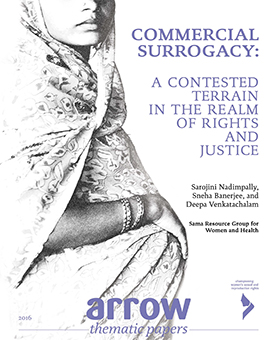251 Arrow Publications
Asia
Region and Country
Thematic Area
Filter by Year

commercial surrogacy: a contested terrain in the realm of rights and justice
Published in 2016
Source:
This paper examines the phenomenon of surrogacy as an industry in India and provides an overview of its operations. An understanding of this industry will be strengthened through an analysis of the regulatory framework in India, and within the broader Asian context. The paper focuses on the way the ideology of family and patriarchal notions […]

fulfilling women’s right to continuum of quality care!
Published in 2014
Source:
Continuum of care has recently been highlighted by the Partnership for Maternal and Neo-Natal and Child Health (PMNCH) and UNICEF as a core principle of programmes for reproductive, maternal, adolescent, newborn, and child health. This modality of care is necessary throughout one’s lifecycle – adolescence, preconception, pregnancy, childbirth, the postnatal period, and childhood – regardless […]

diabetes: a missing link to achieving sexual and reproductive health in the asia-pacific region
Published in 2012
Source:
In recent years, it has become very evident that noncommunicable diseases adversely affect large numbers of women. Gender differentials in access to healthcare, screening services and treatment make women particularly vulnerable to specific noncommunicable diseases. Women are said to account for half the people living with diabetes, and in some countries they have preponderance over […]

arrow for change – understanding men’s responsibilities in addressing gender inequality
Published in 2003
Source:
Are we on the right road now in relation to understanding men’s responsibility in sexual and reproductive health? It is after all, the tenth year of ICPD implementation and next year, the ten year review of the Beijing Platform for Action. Continue reading arrow for change – understanding men’s responsibilities in addressing gender inequality at […]

arrow for change – risky business: women and occupational health
Published in 2001
Source:
While economists and development professionals generally extol the benefits of industrial development, few mention the hidden costs of increased deaths and fatalities at work. Women are amongst the injured and dead as they have “enjoyed” the greatest rise in labour force participation, mainly in lowly paid, low skill manufacturing jobs. Increasingly women’s work is dispersed, […]

arrow for change – women’s well-being: reframing mental health
Published in 2001
Source:
Women need to have control of their lives in order to be physically and mentally healthy. Poverty, gender power relations, gender discrimination and violence against women as the main social determinants of women’s mental health have reduced this control and thus these factors need to be urgently addressed. Central to women’s NGO work in Asia […]

arrow for change – older women’s health: facing the challenges
Published in 1999
Source:
In a region where women continue to be valued less than men, older women’s health reflects their life-long experience of discrimination, deprivation and neglect. The older women of Asia-Pacific today face similar situations of poverty, malnutrition, poor health care, physical overwork and unhealthy work environments in their younger years. Along with high infant mortality rates, […]